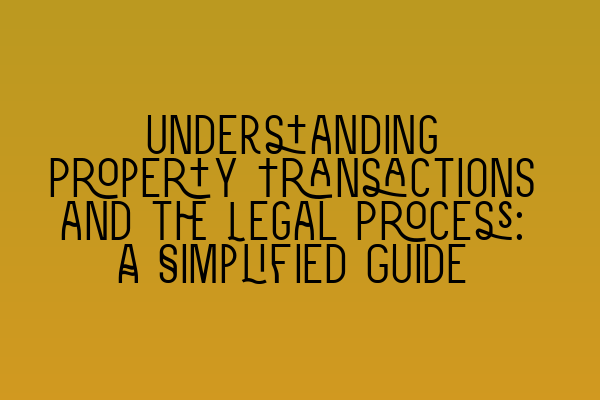Understanding Property Transactions and the Legal Process: A Simplified Guide
When it comes to property transactions, the legal process can often be complex and overwhelming. Whether you are buying or selling a property, it is important to have a clear understanding of the steps involved in order to ensure a smooth and successful transaction. In this guide, we will break down the key elements of property transactions and provide a simplified overview of the legal process.
The Role of a Property Solicitor
In property transactions, a solicitor plays a crucial role in facilitating the legal process and ensuring all necessary steps and requirements are met. Their expertise and knowledge in property law and land law are essential for protecting the interests of their clients.
As a solicitor at SQE Property Law & Land Law, our team has extensive experience in guiding clients through property transactions. We understand the complexities involved and are committed to providing a seamless and efficient service.
Step 1: Instruction and Due Diligence
The first step in a property transaction is the instruction of a solicitor. Whether you are buying or selling, it is important to engage a solicitor early on to begin the due diligence process.
During this phase, your solicitor will conduct various searches and investigations to ensure there are no legal issues or restrictions that may affect the property. These searches may include environmental, planning, and local authority searches.
It is also important to obtain a comprehensive survey of the property to assess its condition and identify any potential issues. This will help you make an informed decision and negotiate the terms of the transaction.
Step 2: Drafting the Contract
Once the due diligence is complete and all necessary information is obtained, the next step is the drafting of the contract. This is a crucial document that outlines the terms and conditions of the sale or purchase.
Your solicitor will review the contract, making sure all relevant details are included and that it accurately reflects your intentions. They will also advise you on any legal implications and negotiate any amendments or additional clauses that may be necessary to protect your interests.
It is important to note that the contract is legally binding once it is signed by both parties, so it is essential to have your solicitor thoroughly review it.
Step 3: Exchange of Contracts and Deposit
Once the contract is finalized, the next step is the exchange of contracts. This is the point at which the transaction becomes legally binding.
During the exchange, both parties will sign identical copies of the contract and the buyer will usually provide a deposit, typically around 5-10% of the purchase price. The deposit is held by the buyer’s solicitor until completion.
Following the exchange of contracts, both parties are legally obligated to proceed with the transaction. If either party fails to meet their obligations, they may be subject to legal consequences.
Step 4: Completion and Transfer of Ownership
Completion is the final stage of the transaction where the remaining balance of the purchase price is paid, and the ownership of the property is transferred to the buyer.
Prior to completion, your solicitor will carry out final searches to ensure there are no new legal issues that may affect the property. They will also coordinate with the seller’s solicitor, mortgage lender (if applicable), and any other relevant parties to ensure a smooth transfer of ownership.
On the completion date, the buyer’s solicitor will transfer the funds to the seller’s solicitor and the keys to the property will be released. The buyer will officially become the legal owner of the property.
Additional Considerations
Throughout the entire legal process, there are several additional considerations that may arise depending on the specific circumstances of the transaction:
- If you are obtaining a mortgage to finance the purchase, your solicitor will coordinate with the mortgage lender to ensure all necessary documentation and requirements are met.
- If you are selling a property, your solicitor will handle the repayment of any outstanding mortgage and ensure the proper discharge of any legal charges.
- If the property is leasehold, your solicitor will review the lease agreement and advise you on any rights and responsibilities associated with it.
- If you are purchasing a new-build property, your solicitor will review the contract with the developer and ensure compliance with any relevant regulations.
Conclusion
Property transactions can be complex, but with the guidance of a knowledgeable solicitor, the process can be simplified and stress-free. At SQE Property Law & Land Law, we are dedicated to providing expert legal advice and assistance throughout the entire property transaction journey.
If you require professional support for your property transaction or want to learn more about property law, feel free to contact SQE Property Law & Land Law for a consultation.
